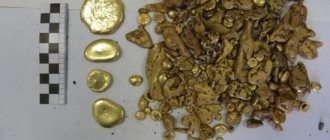ST 192 of the Criminal Code of the Russian Federation.
Evasion of the mandatory delivery for refining or the mandatory sale to the state of precious metals or precious stones extracted from the subsoil, obtained from secondary raw materials, as well as recovered and found, if this act is committed on a large scale, is punishable by a fine of up to two hundred thousand rubles or in the amount wages or other income of the convicted person for a period of up to eighteen months, or forced labor for a term of up to five years, or arrest for a term of up to six months, or imprisonment for a term of up to five years.
Commentary to Art. 192 of the Criminal Code
1. The subject of the crime is precious stones and precious metals mined or received legally, as well as precious metals or precious stones recovered and found.
2. The objective side of the crime is expressed: a) in evading the mandatory delivery for refining or b) in evading the mandatory sale of the listed items to the state.
3. Mined and produced precious metals, with the exception of nuggets of precious metals, after the necessary processing, must be supplied for refining to organizations included in the list approved by the Government of the Russian Federation. Ownership of precious metals after refining remains with their original owners, unless otherwise specified by the terms of the transaction. The operating procedure of organizations carrying out refining of precious metals, the procedure for carrying out transactions with mineral raw materials containing precious metals before refining, as well as the procedure for payment for services provided by these organizations and the deadlines for refining are established by the Government of the Russian Federation (see Decree of the Government of the Russian Federation of December 1, 1998 . N 1419 “On approval of the Procedure for carrying out transactions with mineral raw materials containing precious metals before refining”).
Evasion of mandatory delivery for refining is failure to provide within the established time frame all or at least part of the precious metals and precious stones extracted from the subsoil, obtained from secondary raw materials, or recovered.
4. Refined precious metals in standard form, as well as extracted from the subsoil or recovered precious stones in sorted form, when sold by subjects of their extraction and production, are offered as a priority to: a) a specially authorized federal executive body to replenish the State Fund of Precious Metals and Precious Stones Russian Federation; b) authorized executive authorities of the subjects of the Federation, in whose territories these precious metals and precious stones were mined, to replenish the corresponding state funds of precious metals and precious stones of the subjects of the Federation.
The listed bodies and organizations enjoy the pre-emptive right to purchase precious metals and precious stones only under the conditions of preliminary (for precious metals at least three months before the expected date of purchase) conclusion of purchase and sale agreements for precious metals and precious stones with the subjects of their extraction and production and advance payment (issuance of a deposit) towards payments due from these bodies and organizations under the specified agreements.
At the same time, the right of priority purchase is not equivalent to the mandatory sale referred to in the disposition of the article, and therefore there is a point of view according to which such a form of crime as evasion of the mandatory sale of precious metals to the state has now lost its significance.
Commentary on Article 192 of the Criminal Code of the Russian Federation
1. The subject of the crime is precious stones and precious metals mined or received legally, as well as precious metals or precious stones recovered and found.
2. Refining of precious metals is the process of purifying extracted precious metals from impurities and related components, bringing precious metals to a quality that meets state standards and technical conditions in force in the Russian Federation, or international standards.
3. The objective side of the crime is expressed in evasion of the mandatory delivery for refining or the mandatory sale of the listed items to the state.
Evasion of mandatory delivery is the failure to provide all or at least part of the found or recovered precious metals and precious stones for refining in a timely manner.
4. Refined precious metals in standard form, as well as extracted from the subsoil or recovered precious stones in sorted form, when sold by subjects of their mining and production, are offered as a priority to:
1) a specially authorized federal executive body to replenish the State Fund of Precious Metals and Precious Stones of the Russian Federation;
2) authorized executive authorities of the constituent entities of the Russian Federation, in whose territories these precious metals and precious stones were mined, to replenish the corresponding state funds of precious metals and precious stones of the constituent entities of the Russian Federation.
The listed bodies and organizations enjoy the pre-emptive right to purchase precious metals and precious stones only under the conditions of preliminary (for precious metals at least three months before the expected date of purchase) conclusion of purchase and sale agreements for precious metals and precious stones with the subjects of their extraction and production and advance payment against payments due from these bodies and organizations under these agreements.
5. Large size implies an amount exceeding 1 million 500 thousand rubles.
Second commentary to Art. 192 of the Criminal Code of the Russian Federation
1. Subject - precious metals and precious stones, which: a) are extracted from the subsoil; b) obtained from recycled materials; c) raised and found.
2. The objective side includes:
1) evasion of the mandatory delivery of precious metals for refining;
2) evasion of the mandatory sale of precious metals and stones to the state. The act must be committed on a large scale.
3. Refining of precious metals is an activity carried out by specialized organizations included in the list approved by the Government of the Russian Federation to purify extracted precious metals from impurities and associated chemical elements to increase the precious metal content (Article 1 of the Federal Law of March 26, 1998).
4. The composition is formal.
5. The subjective side is characterized by direct intent.
6. Subject - the head of an organization that mines or produces precious metals or precious stones in accordance with the procedure established by law.
Judicial practice under Article 192 of the Criminal Code of the Russian Federation
Appeal ruling of the Judicial Collegium for Criminal Cases of the Supreme Court of the Russian Federation dated October 3, 2019 N 4-APU19-30
following the verdict of the Ualikhanovsky District Court of the North Kazakhstan Region of the Republic of Kazakhstan dated October 8, 2015. Borisov was found guilty of the fact that on August 19, 2015 in the village Kishkenekol, Ualikhanovsky district, North Kazakhstan region of the Republic of Kazakhstan, acting in a preliminary conspiracy with another person, he illegally entered a residential building, where, using violence dangerous to life and health, he committed a robbery against the victims P. and B., taking possession of their money in the amount of 30,000 and 3,600 tenge. For committing these actions, Borisov was convicted under paragraphs 1, 3, part 2 of Art. 192 of the Criminal Code of the Republic of Kazakhstan for 5 years of imprisonment with serving the sentence in a general regime correctional colony, with confiscation of property, but the sentence was not fully served, since on the basis of the decision of the Kokshetau City Court of the Akmola Region of the Republic of Kazakhstan dated May 22, 2022, he was on parole released for unserved term of 2 years 2 months 26 days. Subsequently, Borisov hid from the control of the specialized authorities of the Republic of Kazakhstan, in connection with which, by the decision of the Ualikhanovsky District Court of the North Kazakhstan Region of the Republic of Kazakhstan dated September 28, 2022, his parole was canceled, and on the basis of a court decision, a preventive measure was chosen against him in the form detention and he is wanted.
Commentary on Article 192 of the Criminal Code of the Russian Federation
The object of the crime is the established procedure for the delivery of precious metals or precious stones.
According to Art. 20 of the Federal Law of March 26, 1998 N 41-FZ “On Precious Metals and Precious Stones” <1> mined and produced precious metals, with the exception of their nuggets, after the necessary processing must be sent for refining to special organizations. The list of such enterprises, as well as the procedure for their work, is approved by the Government of the Russian Federation <2>. The owners of precious metals after refining are the organizations engaged in their extraction, unless otherwise provided by regulatory legal acts.
——————————— <1> RG. 1998. 27 Aug. <2> Decree of the Government of the Russian Federation of August 17, 1998 N 972 “On approval of the operating procedure of organizations engaged in refining of precious metals, and the list of organizations that have the right to carry out refining of precious metals” // RG. 1998. 27 Aug.
Refining of precious metals is the process of purifying extracted precious metals from impurities and related components, bringing precious metals to a quality that meets state standards and technical specifications in force in the Russian Federation, or international standards (Article 1 of the said Law).
In accordance with Part 5 of Art. 2 and Art. 20 of the Federal Law of March 26, 1998 N 41-FZ “On Precious Metals and Precious Stones” the following mined and produced values are offered by the owners to a special federal government body and a government body of a constituent entity of the Russian Federation for acquisition on a priority basis: 1) refined precious metals in standard form; 2) nuggets of precious metals not subject to refining; 3) unique nuggets of precious metals <1>; 4) sorted precious stones; 5) unique gems.
——————————— <1> Resolution of the Government of the Russian Federation of September 22, 1999 N 1068 “On the procedure and criteria for classifying nuggets of precious metals and precious stones as unique” // RG. 1999. 22 Oct.
Such a preemptive right is necessary for the state in order to replenish the State Fund of Precious Metals and Precious Stones of the Russian Federation, the gold reserves of the Russian Federation, and state funds of precious metals and precious stones of the constituent entities of the Russian Federation. When it is sold by the state, organizations engaged in the extraction and production of these valuables are obliged to sell them <1>.
——————————— <1> Some experts believe that violation of the priority order for the sale of valuables constitutes a crime under Art. 191 of the Criminal Code of the Russian Federation. See: Lopashenko P.A. Crimes in the economic sphere: author's commentary on the criminal law (Section VIII of the Criminal Code of the Russian Federation). M., 2006. P. 563.
The subject of the crime is precious metals and precious stones (see commentary to Article 191 of the Criminal Code of the Russian Federation).
In accordance with the disposition of Art. 192 of the Criminal Code of the Russian Federation, valuables must be extracted from the subsoil (by developing deposits), obtained from secondary raw materials (by processing scrap and waste of precious metals and precious stones), and also raised or found (by detecting nuggets of precious metals and precious stones) by organizations carrying out its activities on the basis of permits (licenses).
The objective side of the crime is expressed in inaction - evasion of mandatory delivery for refining or mandatory sale to the state of precious metals or precious stones, consequences in the form of a large amount, causation.
Evasion of the mandatory delivery of precious metals for refining means their failure to provide them to refining organizations.
Evasion of compulsory sale means failure to conclude a purchase and sale agreement for precious metals or precious stones with specially authorized executive authorities in cases established by the current legislation of the Russian Federation.
The act is completed at the moment of expiration of the period for fulfilling the corresponding obligation on a large scale. The corpus delicti is formal.
In accordance with the note to Art. 169 of the Criminal Code of the Russian Federation, a large amount of evasion is understood as the cost of precious metals and precious stones exceeding two hundred and fifty thousand rubles (see commentary to Article 191 of the Criminal Code of the Russian Federation).
Evasion from the mandatory delivery for refining or sale of precious metals or precious stones, associated with their illegal trafficking, is qualified in conjunction with Art. 191 of the Criminal Code of the Russian Federation.
The obligation to submit precious metals or precious stones for refining or sale to the state does not apply to persons mining or producing valuables without an appropriate license. These actions are criminally punishable under Art. 171 of the Criminal Code of the Russian Federation, which provides for liability for illegal business. The subsequent circulation of these items forms the totality of Art. 171 from Art. 191 of the Criminal Code of the Russian Federation.
Failure to deliver precious metals or precious stones for refining and their subsequent theft are additionally qualified under Art. 160 of the Criminal Code of the Russian Federation.
The subjective side is characterized by guilt in the form of direct intent. The person is aware that he is violating the rules for refining or selling precious metals and precious stones to the state on a large scale, and wishes to do so.
The general subject of the crime is a sane individual who has reached the age of sixteen, including the head of an organization engaged in the extraction and production of precious metals and precious stones, the head of an artel of prospectors.


